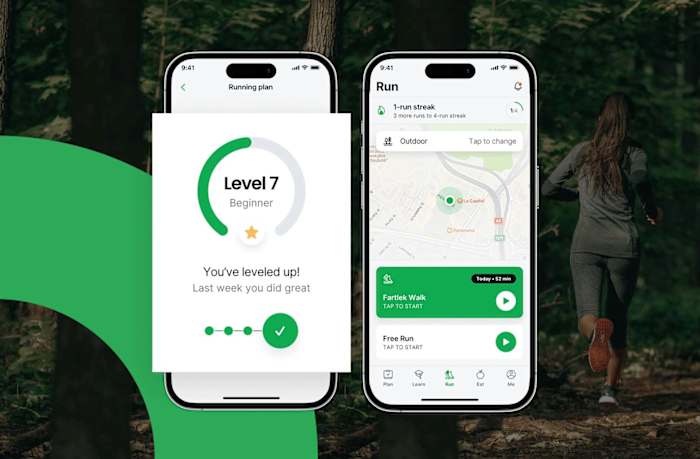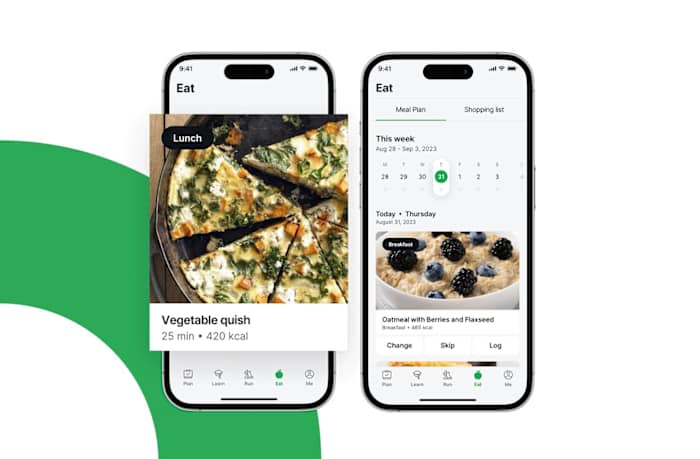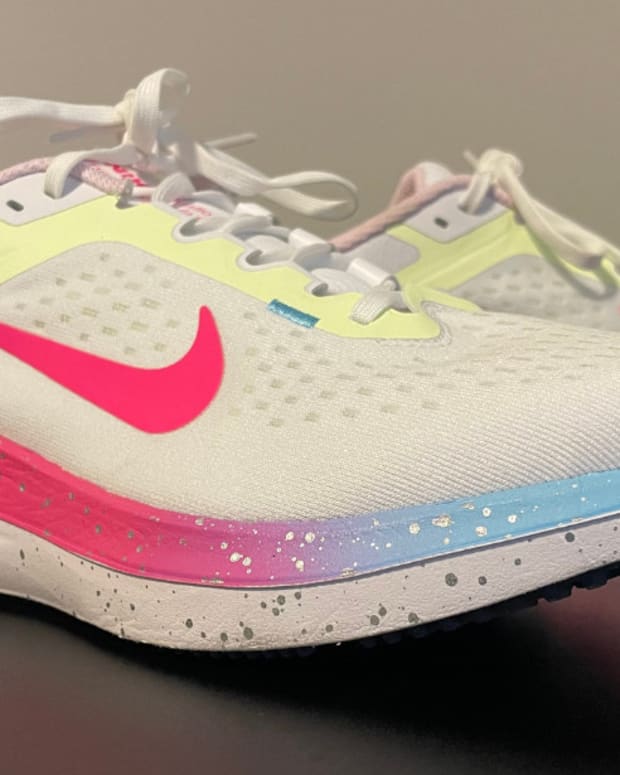The products featured in this article have been independently reviewed. When you buy something through the retail links on this page, we may earn commission at no cost to you, the reader. Sports Illustrated editorial staff are not involved in the creation of this content. Learn more here.
Key Features of Joggo:
- The training app Joggo provides GPS-tracking and audio guidance for your runs
- The subscription-based service also promotes healthy eating with its optional nutrition plans
- Joggo will add strength-based workout routines to your training regimen for $1.99 a week
We’ve all experienced days when we’re reluctant to lace up for a run. Even when you’re nailing your fit check with the best running shoes, running shorts and running shirt, mustering the energy to be your own cheerleader and pace-setter can be taxing. While you could drop some serious cash to hire a personal running coach, there is a much more cost-effective way to get a competitive edge: Joggo.
This running app will create a customized running routine and meal plan to help you meet your competitive goals and wellness targets. Plus, with the app’s ability to track your runs and progress, you’ll have all the accountability you need to stay on course. If you feel like your runs are stuck in a rut, Joggo may be the ideal app to break the slump. Here’s more on the app—who it’s best for, what it costs and how it works—and one SI Showcase editor’s personal experience with the app.
What Is Joggo?
Joggo, founded in 2021 by Ironman athlete Chris Zibutis, is a running app available in both the Apple App Store and Google Play Store. The app is appropriate for beginners, elite runners and everyone in between. It will create a personalized running plan for you depending on your fitness level and goals.
We really like that Joggo can also help guide your nutrition choices, too.
How Joggo Works
You can start your Joggo journey in the app, or online at joggo.run. You’ll answer a series of questions to gauge your health and fitness level, running goals and preferred running times and environment. The app has you choose two to four days of the week when you’ll run before providing a running plan. While this may seem like less running than you might expect, it's by design: Running seven days a week can actually hinder your goals by not leaving time for muscle recovery. The app will also ask if you’d like a personalized meal plan, and ask some follow-up questions if you opt in. Finally, Joggo will grab some basic metrics: age, height, weight, desired weight (if applicable) before spitting out a summary report. Joggo will then deem whether or not you’re safe to take on a running program (although you should always check with your doctor before embarking on big changes to your routine), and from there, lay out what you can expect weight-loss wise, if that’s your goal, and offer subscription plans and costs.
Working Out With Joggo
SI Showcase editor Rachel Pasche, an avid runner, tried Joggo for three weeks. These were her thoughts on the running tracker:
"I opted for the “maintain body weight” option when signing up, so I can’t speak to an option for weight loss, but I still had an overall positive experience with the app. I liked that the workouts were flexible, and that it encouraged you to get out and run as opposed to forcing you into running a certain distance, because that’s not always feasible. Each day would give me the option to participate in either a free run or the workout of the day, which was sometimes just a run or a walk, and sometimes a mixture of running and strength training. I especially enjoyed the workouts with both running and strength training, because those were what made me feel the best and challenged me more than just a run. The workouts were varied enough that it didn’t feel repetitive to check the app each day to see what was on the docket.
My complaints are that there wasn’t an option for people who were already in running shape, and this was especially frustrating when, during a run, Joggo would voice over my music and tell me to slow down, despite the fact that I was already running at what was, for me, a comfortable and easy pace. Perhaps for someone entirely new to running it would be beneficial to have a reminder to keep the pace easy (and by that, I mean slower than a 10-minute mile), but as someone who runs regularly, I found the constant reminders irksome. I also wish there was an option to extend your run on days when you were feeling good, because there were occasions where I would hit the 20-minute mark of the allotted run and feel like I could continue (and I would continue) but Joggo would stop tracking the run once those 20 minutes were up.
Another thing I really enjoyed about using Joggo was the huge wealth of information and tips the app provided, going way beyond what I’ve experienced using other running apps. In addition to detailed articles on running-related topics, such as breathing while running, foot position, avoiding injury and more, there are also tons of articles relating to food choices and nutrition (covering topics like how to eat to properly fuel your body for the runs) and health suggestions for running (such as wearing sunscreen on outdoor runs and hydrating enough). Joggo also comes with an option to curate a meal plan, which I checked out but did not follow, as I already feel confident that I eat healthy and balanced meals. I liked that the meal plan came with meals, snacks and even a shopping list, making it super easy for someone looking to change their diet to buy the necessary foods to prepare healthy meals.
All in all, this is a really well-rounded app for anyone looking to make a healthy change. Between the varied workouts (which include a warm-up and cool-down), the meal plans, the database of informational articles that are great for supplementary learning about a healthy lifestyle and the general pacing of it all, I think this is a great option for someone looking to exercise more, eat healthier and learn about how to make sustainable changes to their lifestyle."
The Pros of Joggo
The main pro of Joggo is that it can tailor a personalized running program regardless of your current skill or fitness level. The training plan gets updated every two weeks to promote progress. The other big pro of Joggo is technically a corollary to one of our misgivings with the app: The emphasis on weight loss. If that’s what you’re looking for, Joggo is for you. The inclusion of nutrition education and meal planning—at no additional cost—sets you up for success to lose weight compared to other fitness apps that lack any food guidance. You’ll also get access to other educational materials with Joggo, which I love, including articles on running technique and injury prevention. Finally, for a small fee (about $1.99 per week), Joggo furnishes strength-training workout plans to follow on the days you’re breaking from running. That’s an excellent way to hit additional goals along your fitness journey without having to hire a personal trainer or pay for an app that includes a strength-training program.
The Cons of Joggo
My main beef with Joggo revealed itself during the sign up process: The app is very fixated on weight loss. For example, after putting in my metrics (which fall square in the middle of “normal” by the albeit totally dubious BMI scale), the app gushed how I could lose 12 pounds within one month of using the app. I found that especially strange considering I hadn’t signed up for a meal plan (and nutrition accounts for about 90 percent of weight loss, experts say), and I had further explicitly stated I was already at my goal weight when signing up. That left a bad taste in my mouth. I noted other reviewers had similar qualms with Joggo, including meal plans that created calorie deficits inappropriate for their weight maintenance or muscle building goals.
I would say the other big con with Joggo is its cost. Although it’s on par with many other fitness apps, like the Daily Burn, if you aren’t interested in the nutrition aspect of the app, you won’t be getting as much out of the monthly cost and may want to use an app more laser-focused on improving your running only.
What Experts Say About Joggo
We spoke with Pete Nastasi, a certified personal trainer and nutritionist, to get his thoughts on Joggo. Right away Nastasi credited the app's simple and effective goal of encouraging individuals to get out there and move more on a daily basis. “Whether your goals are improving overall health and wellness, increasing your fitness or promoting weight loss, adding movement into your daily routine is almost always a great idea,” Nastasi says.
He also stated that what he really liked about the app is that in addition to the personalized running programs, Joggo provides users with educational content that focuses on nutrition, proper breathing techniques, daily motivation and more. “From my work with personal clients, I can attest that a more holistic approach, in combination with an easy-to-follow plan, helps individuals stay motivated, accountable and ultimately successful in achieving their goals,” he says.
Nastasi notes that Joggo may not be for everyone. For starters, you should definitely enjoy running if you’re interested in this app, he says. With that caveat, Joggo did check all of his boxes for a quality health and fitness app, especially since you only need your phone and a pair of running shoes to get started.
Joggo Cost and Subscription
The cost of Joggo varies depending on your responses during the sign-up process; however, you will tend to pay a lower monthly cost the longer you commit to the app. You can also add on strength training at a cost of $1.99 a week. Here’s an example of a plan and its costs after a completed sign-up questionnaire:
- Three months for $46
- Six months for $66
- One month for $33
Joggo FAQ
Can you cancel Joggo?
Yes, you can cancel Joggo by logging into your account on the website, or by emailing hello@joggo.run.
How does Joggo compare to Couch to 5K?
Both Joggo and Couch to 5K are running apps, however, Joggo creates more personalized running plans compared to the more general plans furnished by Couch to 5K.
Does Joggo help you lose weight?
Based on its marketing, Joggo’s primary focus seems to be promoting weight loss, and the app certainly has the potential to do just that given its emphasis on nutrition, especially compared to other running apps, including Couch to 5K.
Is the Joggo app compatible with smart watches?
Yes, Joggo can be synced with the iOS Apple Watch.
Final Thoughts
The Joggo running app is a user-friendly way to dive into running for those who have never had the benefit of a structured running plan. And while we think the app may not be ideal for advanced runners, there are still plenty of runners who could benefit from the guidance of structured runs that include a warm-up and cool-down, and hard-set running times and pace setting.
We did find the educational articles the app provides to be enlightening for experienced runners and beginners alike. All in all though, the app is especially tailored to those who have weight loss goals that they’d like to hit along their running journey, given that there’s an option to follow a nutrition plan provided by Joggo.
But bear in mind that running progress doesn’t have to be tied to a weight loss tracker to be beneficial. On the contrary, weight loss is far from the only reason to pursue running: Regular running is beneficial to well-being and overall health in a wealth of other ways, including your mental health.
Prices are accurate and items in stock as of publish time.











